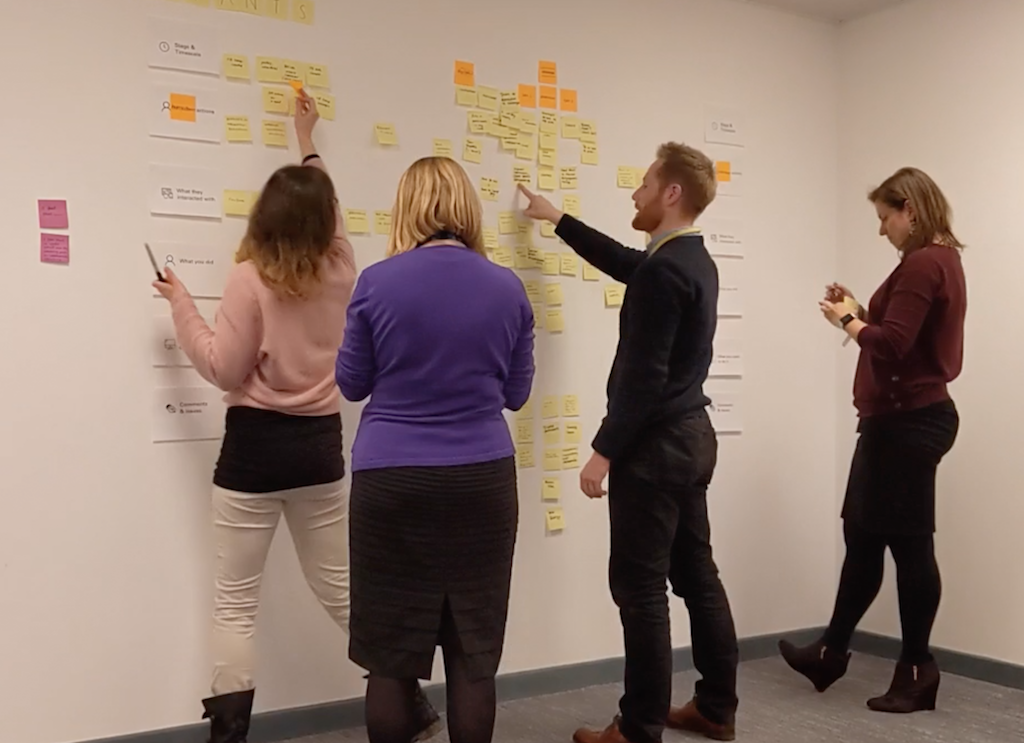
SUMMARY
- Facilitating a series of three sessions to reflect on the Biodata Genome Hackathon’s event with the organising team
- Establishing key learning points and areas for improvement in the next iteration, driven by the user needs of both attendees and the organising team
TEAM: Sigma & Wellcome Genome Trust
WHEN: December 2018
RESULT: A clear set of improvements for the next event, and a roadmap for putting those improvements into action
WHERE WE BEGAN
In Summer 2018, the Wellcome Genome Campus held its first Hackathon on the topic of genomes and biodata. Following the event, the campus team wanted to harness the learning from the event in order to make improvements for next time.
After the event, as Sigma’s Business Designer, I worked with the organising team to capture two journey maps – one for attendees who came to participate in the hackathon, and one for challenge partners who presented challenges to be solved at the hackathon. We captured these two journeys, including the activities that were undertaken by the organising team, who completed them, and what tools or software were used to complete them. I worked closely with my colleague at Sigma, Francis Rowland, to design and facilitate the three sessions.
“Lou’s facilitation skills are second to none – she delved into our collective creative thinking and left us feeling both inspired and motivated.“
Jo Mills, Entrepreneurship and Innovation Centre Manager, Wellcome Genome Campus
LEARNING AND IMPROVING
The Wellcome Genome Campus, home to some of the world’s foremost institutes and organisations in genomics and computational biology, hosted its first Hackathon in Sumer 2018.
This hackathon had a strong entrepreneurial flavour, bringing together academia and industry from the life sciences and pharma, people who could provide patients’ perspectives, UX specialists, and those working actively at the fault line of scientific research and business. It was a heady, exciting mix and the challenge teams came up with concrete, actionable solutions.
The project creator, Jo Mills, wanted to make sure that the next hackathon built on learning from this first event. She wanted support from a facilitator to work with the organising team, using design thinking approaches to encourage continuous improvement. Jo needed facilitation skills to help her capture the journey from the early stages through to the follow up activity after the event, and maintain a laser focus on maximising learning for the next iteration.
FACILITATING THE SESSIONS
APPROACH: Design thinking, coaching style
TOOLS: Journey Maps (retrospective)
- Establishing what Jo Mills and her team had learned through the process of conceiving, planning, and executing the hackathon
- Using journey maps to capture the steps leading up to the event and the activities on the day from the perspectives of:
- Attendees – people who brought their skills and knowledge to the event to help one of the challenge partners
- Challenge partners – organisations who presented a challenge for attendees to solve
- Encouraging a focus on user needs – those of attendees, challenge partners, and the organising team themselves
A CALM, METHODICAL APPROACH
“Lou is considered and methodical, a very careful listener, and brings a calm energy to the room that I very much value.“
Victoria Lebedeva-Baxter, Marketing Manager, Wellcome Genome Campus
sEE THE APPROACH IN ACTION
From Sigma, on twitter: Flashback to yesterday afternoon when we helped some of our lovely partners at @wellcomegenome with a retrospective journey mapping session. It was focused on the activity in the run up to, during, and after one of their key events earlier this year. The aim? (thread)
Simple! To improve the experience for the next event, for two different types of participants
But how do all these sticky notes help to achieve that?
1) Getting everything on the wall helps the team to step back and have a broad perspective about what happened and when, and what the key points are when there’s most activity. This helps with planning the next one, identifying key pressure points for the organising team
2) Connecting the activity that the team themselves undertook (step by step) with the feedback that was received after the event (all on the same wall!) helps the team to see where the key points of communication are, to improve them for next time
3) Connecting the organising team’s activity with what participants were asked to do (and what platforms were used to do it) helps the team to see where things can be simplified and streamlined. So that key tasks for both happen with more ease, next time.
That’s enough from us, though. We’ll hand the baton over to @joanna_mills and her colleagues to tell us what has been most useful, from their perspective, so far!
Originally tweeted by Designed by Sigma (@WeAreSigma) on December 11, 2018.
WHAT WE SHARED
I set up a timelapse app on a smartphone to capture one of the sessions – the one in which we created the journey map for attendees. After the session I worked with Sigma’s Production Assistant, Clare Reucroft, to write up the process in that twitter thread, shown above.
WHAT HAPPENED NEXT
The Wellcome Genome Campus team had planned to run their next hackathon in Summer 2020, but the Covid-19 (Coronavirus) pandemic postponed their plans. You can sign up to be the first to hear about the date for the next event on the Wellcome Genome Campus website.